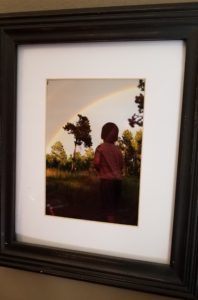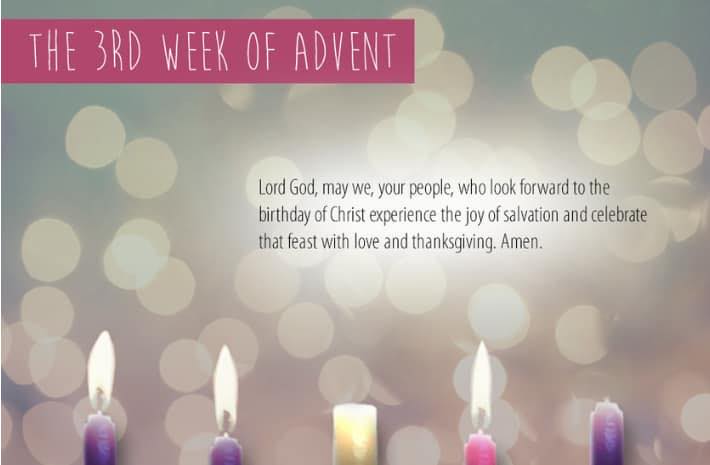A big piece of the joy of our salvation is the gift of wonder; wonder lived out in expectancy.
Our oldest GRAND, Jack, (now 15) was only 3 years old when he saw his first rainbow. His picture hangs  above my desk and speaks wonder, amazement, marveling, expectancy. I never want to stop wondering and being amazed and expectant by God’s creation. God delights in our child-like wonder and expectancy.
above my desk and speaks wonder, amazement, marveling, expectancy. I never want to stop wondering and being amazed and expectant by God’s creation. God delights in our child-like wonder and expectancy.
Zechariah struggled with the concept of wonder. His knowing didn’t allow him to trust Gabriel’s message, an answer to his own long-prayed prayer. “But the angel said to him, ‘Do not be afraid, Zechariah, for your prayer has been heard, and your wife Elizabeth will bear you a son, and you shall call his name John.'” (Luke 1:13) His response, “How shall I know this? For I am an old man, and my wife is advanced in years.” (Luke 1:18) Zechariah had expectations based on his human understanding. God was on the move and Zechariah failed to trust. Expectancy foiled. Wonder aborted.
The theme of wonder continues through Luke’s narrative. All their neighbors knew of God answering Zechariah and Elizabeth’s many-long-years prayer for a son. They rejoiced with them when the baby was born. But then! The baby is now eight days old and it’s time for him to be publicly named and circumcised. The neighbors were sure he would be named Zechariah after his father. Elizabeth surprised them all, “No; he shall be called John.” (Luke 1:60).
Not trusting Elizabeth, the neighbors turned to Zechariah. He wrote on a tablet confirming, “his name is John”. And they all wondered! Eugene Peterson’s words in The Message Rendition read, “That took everyone by surprise. Surprise followed surprise …”
This piece of the narrative concludes, “A deep, reverential fear settle over the neighborhood, and in all that Judean hill country people talked about nothing else. Everyone who heard about it took it to heart, wondering, ‘What will become of this child? Clearly, God has his hand in this.'” (Luke 1:65 and 66, The Message). Their sense of expectancy now alive.
Zechariah’s story is only the beginning of the concept of wonder throughout the Christmas narrative and beyond. Other words used are “considered” (Joseph in Matthew 1:20); “troubled” (Zechariah in Luke 1:12); “greatly troubled and tried to discern” (Zechariah in Luke 1:29); “wondered” (used to describe the Shepherds as well, (Luke 2:18); “treasured, pondered” (Mary in Luke 2:19 and 51); “marveled” (Mary and Joseph in Luke 2:33).
Wonder is often shown in the questions we ask. Not the demanding questions … like prove it; not the challenging questions … like really, this couldn’t be. Rather, the desiring questions, help me to believe, help me to trust. Please, will you grow my faith. Help me to live with expectancy.
Wonder may often be best seen through the eyes of a child in their amazement, curiosity, openness and in their simple trusting questions.
We too practice wonder when we live out our child-like faith.
Wonder can lead to expectancy.
“Rather than expectations, I’ve learned to maintain expectancy,
which is a sense of awe at the divine-human encounter
that is breaking in on everything we call ordinary and routine.”
Craig Barnes, Diary of a Pastor’s Soul
Leah is our youngest GRAND, just 20 months old this Christmas. This photo is from last  Christmas. Do you see the wonder as she ponders those tiny Christmas lights. I have this one hanging right under the picture of Jack. I learn so much from our GRANDS.
Christmas. Do you see the wonder as she ponders those tiny Christmas lights. I have this one hanging right under the picture of Jack. I learn so much from our GRANDS.
How would you title this picture?
Father, I ask for myself, I ask for my friends, that our sense of wonder would be alive and well this Christmas season. May we live with the expectancy and awe of encountering and experiencing You each and every day. Amen
Thursday, December 23, Worship and Expectancy.
Copyright, Sue Tell, December 2021
